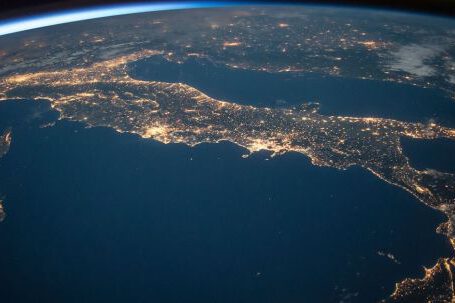Our planet Earth is a fascinating place, with many natural phenomena that contribute to its uniqueness. One such phenomenon is the presence of a magnetic field, which acts as a protective shield, keeping harmful particles and radiation from reaching the surface. In this article, we will explore the importance of magnetic fields and how they safeguard our planet.
The Basics of Magnetic Fields
To understand how magnetic fields protect our planet, we first need to grasp the basics of what a magnetic field is. Simply put, a magnetic field is an invisible force that surrounds an object with a magnetic charge. On Earth, this magnetic field is generated by the movement of molten iron in our planet’s core.
Deflecting Solar Wind
One of the main ways in which magnetic fields shield our planet is by deflecting solar wind. Solar wind is a stream of charged particles emitted by the Sun. Without the protection of our magnetic field, these particles would have a direct impact on our atmosphere, causing significant damage.
However, as solar wind approaches Earth, it encounters our magnetic field. The charged particles within the solar wind interact with the Earth’s magnetic field, causing them to be deflected away from our planet. This deflection ensures that these particles do not reach the surface and cause harm to living organisms.
Protecting from Harmful Radiation
In addition to deflecting solar wind, magnetic fields also protect our planet from harmful radiation. Cosmic rays, which are high-energy particles originating from outer space, pose a threat to life on Earth. However, our magnetic field acts as a shield, preventing most of these particles from reaching the surface.
When cosmic rays enter our magnetic field, they follow its lines of force and are guided away from Earth. This shielding effect is particularly crucial for protecting astronauts in space and preventing damage to our technology, such as satellites and spacecraft.
Maintaining Atmospheric Stability
Another significant role of magnetic fields in protecting our planet is maintaining atmospheric stability. Our atmosphere is composed of different layers, each with its own unique properties. The magnetic field helps to keep these layers in place, preventing them from being stripped away by solar wind.
Solar wind has the potential to erode the upper layers of our atmosphere, which would have severe consequences for life on Earth. However, the magnetic field acts as a barrier, preventing the erosion of these layers and maintaining the stability of our atmosphere.
Implications for Habitability
The presence of a magnetic field is essential for the habitability of our planet. Without this protective shield, Earth would be exposed to the full force of solar wind and cosmic rays, making it inhospitable for life as we know it.
The study of other planets and celestial bodies has shown that those lacking a magnetic field, such as Mars, have a thinner atmosphere and are more vulnerable to the harmful effects of space radiation. Understanding the role of magnetic fields in protecting our planet can inform our exploration of other planets and the search for habitable environments beyond Earth.
In conclusion, the magnetic field surrounding our planet plays a vital role in protecting it from the harmful effects of solar wind and cosmic rays. By deflecting these particles and maintaining atmospheric stability, magnetic fields ensure the habitability of Earth. The study of magnetic fields not only deepens our understanding of our own planet but also informs our exploration of the universe beyond.





